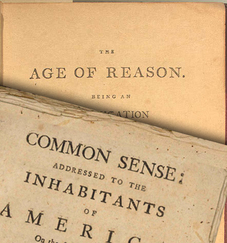 One of the more perplexing aspects of the American Revolution is the contrast between Thomas Paine's pamphlet Common Sense and his later work Age of Reason. In Common Sense, Paine relied heavily on arguments from Scripture to prove his point, but in Age of Reason, he ridiculed the Bible and claimed that “It is from the Bible that man has learned cruelty, rapine, and murder." For many, this contrast is an unsolvable mystery; for others, it is evidence that Paine molded his writings to appeal to the sentiments of his intended audience; but I suspect that there is a better explanation. The thing that most people don't realize about Thomas Paine is that his famous pamphlet was not his own idea. Paine arrived in America in 1774, and by 1776, he had accepted a position as the editor of a Philadelphia based magazine. Several of his articles attracted the attention of Dr. Benjamin Rush, a sincere Christian patriot who was soon to become one of the signers of the Declaration of Independence. Dr. Rush recorded for us what transpired next:
When the subject of American independence began to be agitated in general conversation, I observed the public mind to be loaded with an immense mass of prejudice and error relative to it. Something appeared to be wanting to move them, beyond the ordinary short and cold addresses of newspaper publications. At this time I called upon Mr. Paine, and suggested to him the propriety of preparing our citizens for a perpetual separation of our country from Great Britain, by means of a work of such length, as would obviate all the objections to it. He seized the idea with avidity, and immediately began his famous pamphlet in favour of that measure. He read the sheets to me at my house, as he composed them. When he had finished them, I advised him to put them into the hands of Dr. Franklin, Samuel Adams, and the late Judge Wilson; assuring him at the same time, that they held the same opinion that he had defended. From this statement by Dr. Rush, we can see that he specifically commissioned Paine to write Common Sense and that he reviewed every page of this pamphlet as it was completed. Dr. Rush does not give us any details of the specific instructions that he gave to Paine when he employed him to write this pamphlet, but the use of Scripture as the core of the argument against the monarchy is much more in line with Dr. Rush's well known Christian character than with Paine's skepticism. It is certainly true that Dr. Rush approved of the arguments in Common Sense, and just as certain that he reviled the ideas that Paine later made public in The Age of Reason. In the same letter quoted above, Dr. Rush also wrote: I did not see Mr. Paine when he passed thro Philadelphia a few years ago. His principles avowed in his "Age of Reason" were so offensive to me that I did not wish to renew my intercourse with him. I don't suppose that we will ever know for sure exactly how much of Common Sense was composed of Paine's ideas and how much of Dr. Rush's, but I suspect that Dr. Rush's involvement is the best explanation for the stark contrast between the scriptural arguments given in this pamphlet and the blasphemous rantings of Paine's Age of Reason. On another note entirely, one of the things that piqued my interest in Common Sense was the recognition of the republican nature of Israel's government. In this pamphlet, Paine (or perhaps Dr. Rush) demonstrated his knowledge of the once commonly accepted idea that God favored republican governments because that was the kind of government that He gave to His own chosen nation. Here is how this idea was expressed in Common Sense: Near three thousand years passed away, from the Mosaic account of the creation, till the Jews under a national delusion requested a king. Till then their form of government (except in extraordinary cases where the Almighty interposed) was a kind of Republic, administered by a judge and the elders of the tribes.
0 Comments
Your comment will be posted after it is approved.
Leave a Reply. |
Bill Fortenberry is a Christian philosopher and historian in Birmingham, AL. Bill's work has been cited in several legal journals, and he has appeared as a guest on shows including The Dr. Gina Show, The Michael Hart Show, and Real Science Radio.
Contact Us if you would like to schedule Bill to speak to your church, group, or club. "Give instruction to a wise man, and he will be yet wiser: teach a just man, and he will increase in learning." (Proverbs 9:9)
Search
Topics
All
Archives
June 2024
|


 RSS Feed
RSS Feed